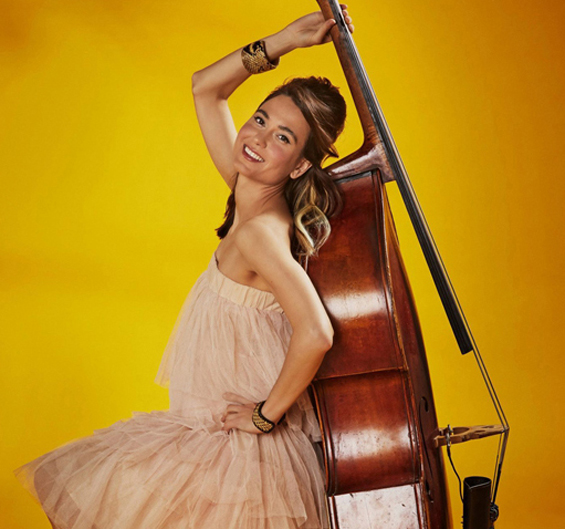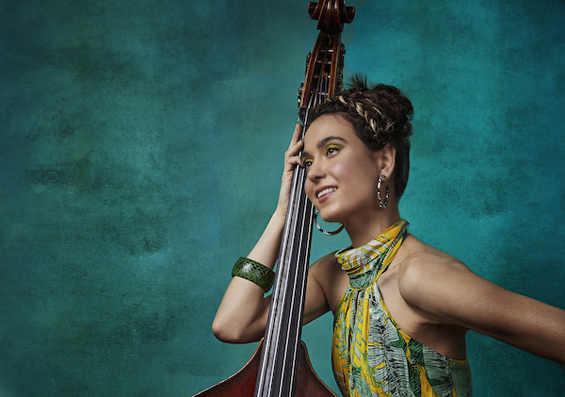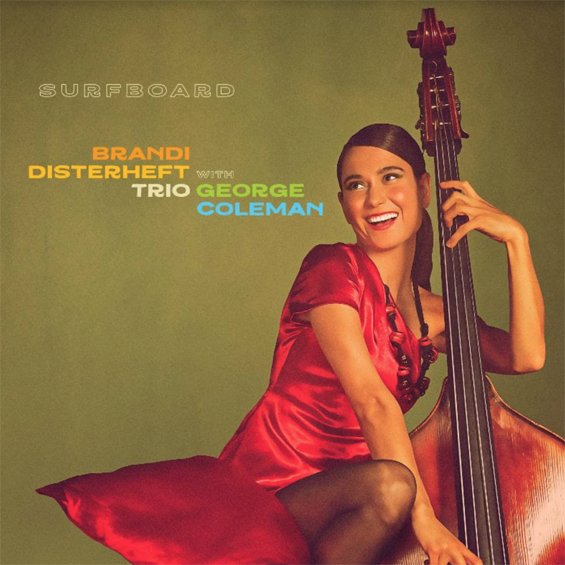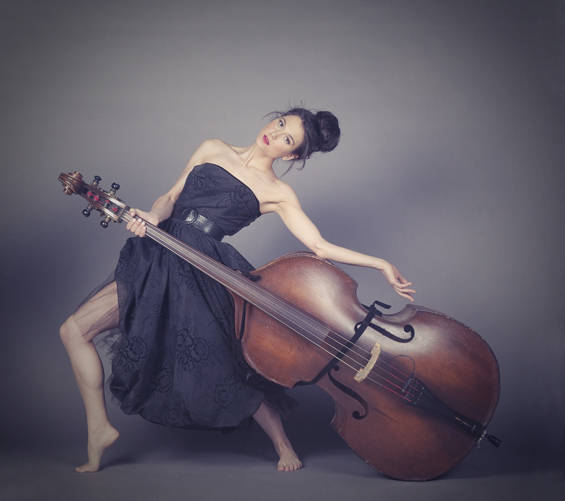

photo:
Joanne K
FIVE QUESTIONS WITH BRANDI DISTERHEFT
Brandi Disterheft's traveled a long way from her Vancouver origins to her current position as an established NYC jazz bassist. Having grown up in a family whose members include a Chicago-born jazz organist mother and a Grammy Award-winning session singer aunt, Brandi's career in music was seemingly predestined. A Juno for her debut album—titled Debut, naturally—led to an apprenticeship with Ron Carter and, eventually, relocation from Toronto to New York. Over the years, she's played with Hank Jones, Anita O'day, Vincent Herring, and Renee Rosnes, and performed with pianist Harold Mabern and drummer Joe Farnsworth on her fourth album, 2016's Blue Canvas. Her new Surfboard (reviewed here) pairs Disterheft with pianist Klaus Mueller, drummer Portinho, and tenor saxophonist George Coleman on an expansive set heavily influenced by Brazilian jazz and featuring the bassist playing and singing. textura had the pleasure of speaking with her on the verge of the album's release.
1. Everyone's story is fascinating in its own way, but yours is incredible. A Vancouver native, you attended Humber College in Toronto whilst also traveling to New York on the overnight Greyhound bus to play. And then, if I've got the story right, you moved to NYC a decade ago to study under no less than Ron Carter. What was the experience like apprenticing under a member of Miles Davis's great quintet, and what did you learn most from the bassist?
Almost right! Post-graduating I stayed in Toronto for a few years performing, touring, and working every night as a jazz bassist. Then my debut album Debut won the JUNO. My mother, also a jazz musician, kept asking me when I was going to make the move to NYC? I did made the move to NYC to seek out Ron Carter. It took me longer to get work in NYC, as I didn't go to school there, so I was sitting in at the jam sessions until the wee hours of the morning to pickup work. Hence where the overnight Greyhound bus comes in! I still had a lot of lucrative work in Toronto, and that overnight bus instills a gutbucket sound in your bass playing with some scary moments.
I had heard from different bassists that Mr. Carter was a phenomenal teacher with a real method, as well as of course redefining modern bass playing. I also heard he could take away the iron fist (perhaps overcompensating for being a girl I wanted to prove I had a huge sound) and lighten my touch to produce a bigger, warmer sound with less effort. His refined bass playing is much like his personality. He is one of the last living legends. I had to track him down.
2. On tracks such as “Surfboard” and “Speak Low,” the music swings effervescently, and there's an undeniable chemistry between you and your partners. How did this particular line-up come together, and what, in your view, does each partner bring to the performances on Surfboard that makes it so special?
The great George Coleman, most recognized for his work with Miles Davis and Herbie Hancock, I met through the late pianist Harold Mabern, whom I recorded with on my prior album Blue Canvas. Harold and George were childhood friends; they grew up together in Memphis along with the revered prodigy pianist Phineas Newborn who was a few years their senior.
George Coleman has his own language, his own sound, which may sound like “blazing notes or sheets of sound,” but at the same time, his expression is utterly relaxed. It's like nothing I have ever heard before. He is a true master. You can hear this mastery first-hand on the ballad “My Foolish Heart” on the new record: George shines!
Klaus Mueller studied with Richie Beirach at NYU: he has the most pearly sound and is a harmonic wizard. Klaus had been (the drummer) Portinho's pianist for over 20 years. Klaus and Portinho were already a team, similar to my last album Blue Canvas where Harold Mabern and Joe Farnsworth were already partners.
Portinho is a very special musician and friend! (see below)

photo: Joanne K
3. While Surfboard includes fresh re-imaginings of material from the Great American Songbook (“My Foolish Heart,” “Where or When,” “Speak Low”), a number of songs, among them the Carlos Jobim-penned title track and Moacir Santos's “Nanã,” show a pronounced Brazilian Jazz influence. What prompted the focus on that style, and from where does your interest in it stem?
The project gestated out of a decade-long musical relationship with the drummer Portinho, whom I met soon after I moved to New York. Our simpatico connection developed during years as a working band, on numerous concerts I led, and also at Portinho's five-sets-a-night weekend sinecure at a Brazilian churrascaria in Manhattan with Klaus holding down the piano chair. Some of the songs are obscure Brazilian songbook gems from Porto's (Portinho's) book. His first gigs in New York were with Monk's saxophonist Charlie Rouse. He's worked with Tania Maria, Harry Belafonte, Nancy Wilson, and Astrid Gilberto to name a few.
Portinho molded me into 'his' Brazilian Jazz bassist. He often would give me listening homework and would say, “Try this rather than this.” I wanted to record us, for Porto has a way of uplifting the beat. He is revered as the definitive Brazilian drummer and is now in his eighties. He is so funky, with such an infectious groove, and he has so much dynamic range. He has strict rules, but once you learn them, he wants you to break away. He's always anticipating, turning around the phrases. It's so much fun.

4. Surfboard is distinguished by many things, your writing and bass playing, to begin, but also the very distinctive singing you bring to “Prelude to Coup de Foudre,” “One Dream,” and others. Did you formally train as a singer, and was your singing influenced by others? Your bio, for example, indicates it was your aunt, a Grammy-winning session singer, who encouraged you to sing.
I grew up listening to my aunt; one pivotal record she sings on is “Arara” by Sergio Mendes. I knew I always wanted to be like her, sound like her. Since I studied piano and bass intently as a child, singing came later. I remember I also loved to write short stories as a little girl, and also composed on the piano. I had taken voice lessons as a child, but not until I began writing lyrics with my music was I motivated to sing.
For many years, I was only interested in performing instrumental music to explore that “swing” feeling from walking the bass. Also, post-college I was studying classical bass with Toronto's Ed Tait, which is like advanced algebra on this hidden and mysterious ebony finger, so many combinations of fingering to produce the same result! The bass was enough to take on initially!
5. Your advanced bass-playing ability comes through loud and clear on Surfboard. Given that two of the album's songs are by Oscar Pettiford (“The Pendulum at Falcon's Lair”) and Sam Jones (“Del Sasser”), I'm wondering which bassists you'd cite as primary inspirations and/or influences, and if you had to select a couple of favourite bass performances on record by others what would they be?
Larry Gales on Live at the It Club with Monk, for his wonderful walking bass solos; Jimmy Garrsion on Live at the Half Note with Lennis Tristano, for his huge walking bass lines; and Jimmy Blanton on Duets with Ellington.

photo: Joanne K
Bonus question: You've played around the world on some of the best stages and with many a jazz great. What performances stand out for you as especially memorable and for what reason?
Well, the Vienna Opera House made me say a prayer of thanks, seeing those red velvet doors. The far distance, the chalk smell of the stage, and imagining hundreds of years of powerful music echoing in that stunning venue. Massey Hall also made my heart drop to think that Charles Mingus and Charlie Parker once stood on that same stage.
However, my mother is a B3 organist/ jazz pianist from Chicago. She was my first bandleader as a teenager growing up in Vancouver. These are some of my fondest memories. She taught me how to navigate through changes of songs not only by reading charts, but by often only using my ears. I have a large repertoire of jazz standards I know by ear now, which is perhaps the most important arsenal for any working jazz musician. She gave me the confidence early on to believe I could succeed. All I needed, she would say, was to have a dream.website: BRANDI DISTERHEFT
October 2020![]()